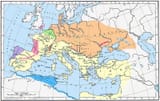Search Results
7/4/2025, 9:44:10 PM
>>17814782
>>17814788
>The German epic poem Nibelungenlied portrays Etzel as a noble and generous ally, while Atli in the Volsunga Saga and the Poetic Edda (as well as Ætla in Widsith) is a cruel miser.
https://en.m.wikipedia.org/wiki/Burgundians
>Another part of the Burgundians stayed in their previous homeland in the Oder-Vistula basin and formed a contingent in Attila's Hunnic army by 451.[1][2]
https://www.diva-portal.org/smash/get/diva2:1226417/FULLTEXT01.pdf
> A new dimension to Hunnic influence in Scandinavia was presented by Charlotte Fabech (1991) in her interpretation of the Sösdala finds and others as evidence of Hunnic influence on funerary rituals in south Sweden.
Attila's empire was short lived, but his legacy is massive. He's a pivotal character in a lot of Germanic sagas like Völsunga saga, the Nibelungenlied and Þiðreks saga.
The germanic tribes considered Attila, Atli, or Etzel to be a founding father of the Germanic kingdoms, his daughters and sons becoming wives and generals of the kingdoms that would supplant the Western Roman Empire.
Attila the Hun appears as Etzel and Atli in Germanic epics, where he terrorises the Germanics and has sex with a Germanic princess.
Germans and Norse Vikings literally have Attila (Atli or Etzel) in their epic sagas, where he marries and impregnates a Germanic princess.
Attila's army also fought in France, and Hunnic Y DNA (Haplogroup Q subclade) has been found in Scandinavia.
The Huns impacted all Germanic people.
>>17814788
>The German epic poem Nibelungenlied portrays Etzel as a noble and generous ally, while Atli in the Volsunga Saga and the Poetic Edda (as well as Ætla in Widsith) is a cruel miser.
https://en.m.wikipedia.org/wiki/Burgundians
>Another part of the Burgundians stayed in their previous homeland in the Oder-Vistula basin and formed a contingent in Attila's Hunnic army by 451.[1][2]
https://www.diva-portal.org/smash/get/diva2:1226417/FULLTEXT01.pdf
> A new dimension to Hunnic influence in Scandinavia was presented by Charlotte Fabech (1991) in her interpretation of the Sösdala finds and others as evidence of Hunnic influence on funerary rituals in south Sweden.
Attila's empire was short lived, but his legacy is massive. He's a pivotal character in a lot of Germanic sagas like Völsunga saga, the Nibelungenlied and Þiðreks saga.
The germanic tribes considered Attila, Atli, or Etzel to be a founding father of the Germanic kingdoms, his daughters and sons becoming wives and generals of the kingdoms that would supplant the Western Roman Empire.
Attila the Hun appears as Etzel and Atli in Germanic epics, where he terrorises the Germanics and has sex with a Germanic princess.
Germans and Norse Vikings literally have Attila (Atli or Etzel) in their epic sagas, where he marries and impregnates a Germanic princess.
Attila's army also fought in France, and Hunnic Y DNA (Haplogroup Q subclade) has been found in Scandinavia.
The Huns impacted all Germanic people.
6/29/2025, 12:11:42 AM
>>63909818
There is no surviving first-hand account of Attila's appearance, but there is a possible second-hand source provided by Jordanes, who cites a description given by Priscus.[6][7]
He was a man born into the world to shake the nations, the scourge of all lands, who in some way terrified all mankind by the dreadful rumors noised abroad concerning him. He was haughty in his walk, rolling his eyes hither and thither, so that the power of his proud spirit appeared in the movement of his body. He was indeed a lover of war, yet restrained in action, mighty in counsel, gracious to suppliants and lenient to those who were once received into his protection. Short of stature, with a broad chest and a large head; his eyes were small, his beard thin and sprinkled with grey; and he had a flat nose and swarthy skin, showing evidence of his origin.[8]:182–183
Some scholars have suggested that this description is typically East Asian, because it has all the combined features that fit the physical type of people from Eastern Asia, and Attila's ancestors may have come from there.[7][9]:202
There is no surviving first-hand account of Attila's appearance, but there is a possible second-hand source provided by Jordanes, who cites a description given by Priscus.[6][7]
He was a man born into the world to shake the nations, the scourge of all lands, who in some way terrified all mankind by the dreadful rumors noised abroad concerning him. He was haughty in his walk, rolling his eyes hither and thither, so that the power of his proud spirit appeared in the movement of his body. He was indeed a lover of war, yet restrained in action, mighty in counsel, gracious to suppliants and lenient to those who were once received into his protection. Short of stature, with a broad chest and a large head; his eyes were small, his beard thin and sprinkled with grey; and he had a flat nose and swarthy skin, showing evidence of his origin.[8]:182–183
Some scholars have suggested that this description is typically East Asian, because it has all the combined features that fit the physical type of people from Eastern Asia, and Attila's ancestors may have come from there.[7][9]:202
Page 1

